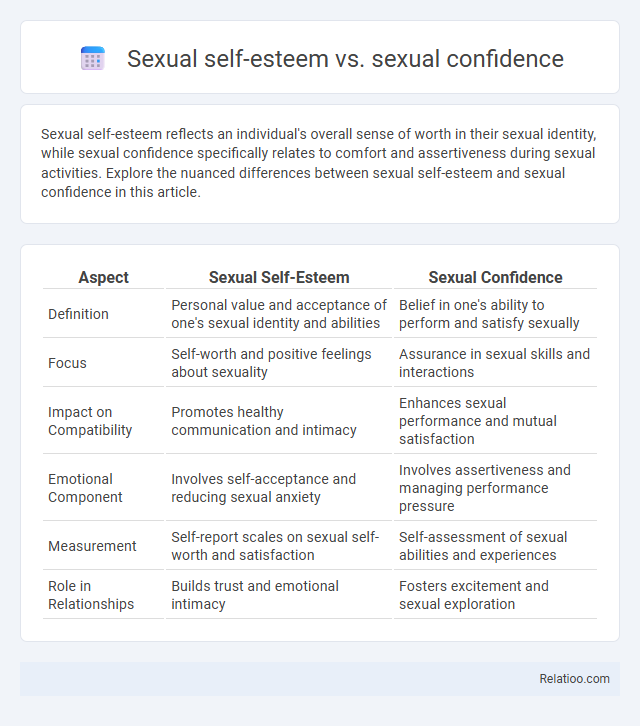Sexual self-esteem reflects an individual's overall sense of worth in their sexual identity, while sexual confidence specifically relates to comfort and assertiveness during sexual activities. Explore the nuanced differences between sexual self-esteem and sexual confidence in this article.
Table of Comparison
| Aspect | Sexual Self-Esteem | Sexual Confidence |
|---|---|---|
| Definition | Personal value and acceptance of one's sexual identity and abilities | Belief in one's ability to perform and satisfy sexually |
| Focus | Self-worth and positive feelings about sexuality | Assurance in sexual skills and interactions |
| Impact on Compatibility | Promotes healthy communication and intimacy | Enhances sexual performance and mutual satisfaction |
| Emotional Component | Involves self-acceptance and reducing sexual anxiety | Involves assertiveness and managing performance pressure |
| Measurement | Self-report scales on sexual self-worth and satisfaction | Self-assessment of sexual abilities and experiences |
| Role in Relationships | Builds trust and emotional intimacy | Fosters excitement and sexual exploration |
Understanding Sexual Self-Esteem
Sexual self-esteem refers to your overall evaluation and feelings of worth related to your sexual identity and experiences, influencing how you perceive yourself in intimate situations. Sexual confidence is the expression of that self-esteem, reflecting your comfort and assertiveness during sexual activities. Understanding sexual self-esteem involves recognizing its impact on your emotional well-being and relationships, promoting a healthy acceptance of your sexuality.
Defining Sexual Confidence
Sexual confidence refers to an individual's comfort and assurance in their sexual abilities, desires, and interactions, directly impacting their overall sexual satisfaction and relationships. Unlike sexual self-esteem, which centers on one's valuation of their sexual worth and attractiveness, sexual confidence emphasizes active expression and competence in sexual contexts. Understanding sexual confidence is crucial for enhancing communication, consent, and intimacy between partners, fostering healthier sexual experiences.
Key Differences Between Sexual Self-Esteem and Sexual Confidence
Sexual self-esteem refers to your overall sense of self-worth and acceptance regarding your sexuality, encompassing how you value yourself as a sexual being. Sexual confidence, on the other hand, is the practical expression of comfort and assurance in sexual situations, demonstrating your ability to engage confidently with partners. The key difference lies in sexual self-esteem being a deeper internal belief system, while sexual confidence is its outward manifestation during sexual experiences.
The Psychological Roots of Sexual Self-Esteem
Sexual self-esteem stems from deep psychological roots involving early attachment experiences, body image, and internalized beliefs about worthiness and desirability, which shape one's overall sexual self-perception. Unlike sexual confidence, which relates more to skills and comfort in sexual situations, sexual self-esteem is fundamentally tied to an individual's self-worth and emotional acceptance within their sexual identity. Research indicates that nurturing positive sexual self-esteem requires addressing underlying psychological factors such as past traumas, cognitive distortions, and emotional regulation patterns.
How Sexual Confidence Manifests in Relationships
Sexual confidence manifests in relationships through open communication, mutual respect, and a positive body image, fostering increased intimacy and satisfaction. It involves embracing one's sexual desires and boundaries without fear or shame, which enhances emotional connection and trust between partners. Unlike sexual self-esteem, which relates more to overall self-worth tied to sexuality, sexual confidence actively shapes partner interactions and the expression of sexuality within the relationship.
Factors Influencing Sexual Self-Esteem
Sexual self-esteem is shaped by factors such as body image, past sexual experiences, and societal attitudes toward sexuality, which directly impact your perception of sexual worth and desirability. Sexual confidence, while related, emphasizes your comfort and assertiveness in sexual situations, often influenced by communication skills and positive reinforcement from partners. Understanding these factors helps distinguish sexual self-esteem from sexual confidence, highlighting the importance of healthy self-perception in fostering a fulfilling sexual identity.
Building and Boosting Sexual Confidence
Sexual self-esteem reflects an individual's overall sense of worth regarding their sexual identity and abilities, while sexual confidence specifically pertains to the comfort and assurance one feels during sexual activities. Building and boosting sexual confidence involves practices such as open communication, self-exploration, and positive affirmations that enhance body awareness and reduce performance anxiety. Strengthening sexual confidence consistently contributes to improved intimacy, satisfaction, and healthier sexual relationships.
The Impact of Sexual Self-Esteem on Intimacy
Sexual self-esteem profoundly influences intimacy by shaping an individual's comfort and satisfaction within sexual relationships. Higher sexual self-esteem correlates with enhanced communication, emotional connection, and mutual trust between partners, facilitating deeper intimacy. Conversely, low sexual self-esteem can hinder vulnerability and openness, often leading to reduced intimacy and relational dissatisfaction.
Overcoming Barriers to Healthy Sexual Self-Image
Sexual self-esteem reflects an individual's overall sense of worthiness and acceptance regarding their sexuality, while sexual confidence refers to the ability to express and enjoy sexual experiences comfortably. Overcoming barriers to a healthy sexual self-image often involves addressing past trauma, societal stigma, and unrealistic media portrayals that contribute to negative self-perceptions. Techniques such as therapy, open communication with partners, and education on sexual health can significantly improve both sexual self-esteem and sexual confidence, leading to a more fulfilling and positive sexual identity.
Integrating Self-Esteem and Confidence for Fulfilling Sexual Experiences
Integrating sexual self-esteem and sexual confidence cultivates a positive self-perception and empowers individuals to express their desires and boundaries, enhancing overall sexual satisfaction. Sexual self-esteem involves valuing oneself as a sexual being, while sexual confidence reflects the comfort and assertiveness in sexual interactions. Developing both aspects through self-awareness and communication fosters fulfilling and respectful sexual experiences.

Infographic: Sexual self-esteem vs sexual confidence
 relatioo.com
relatioo.com